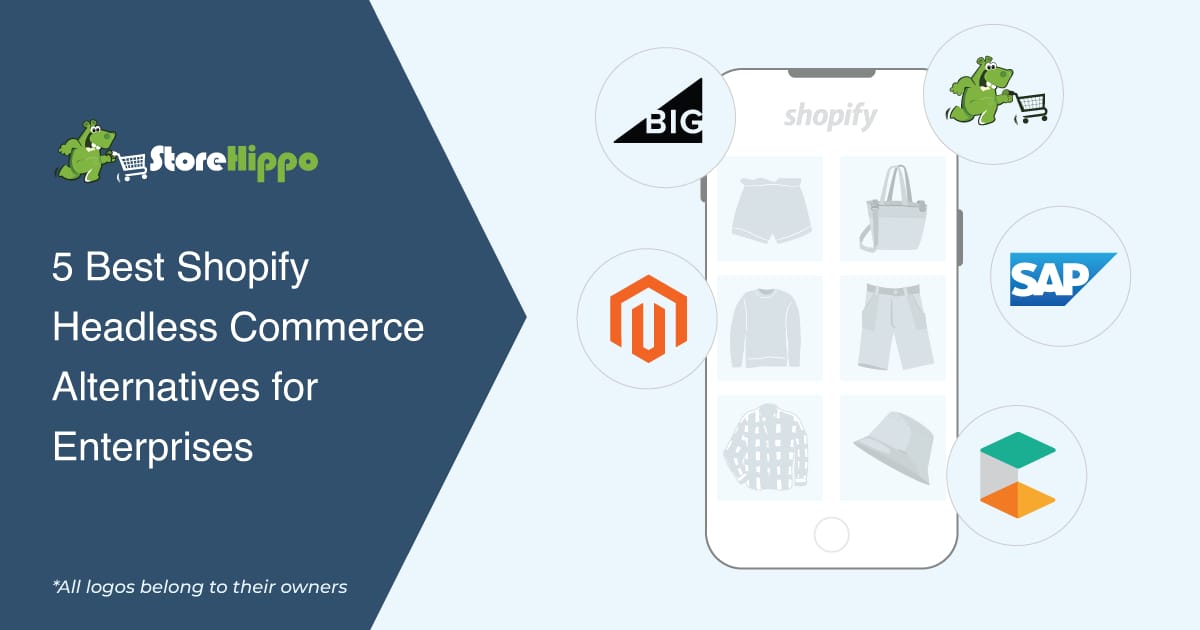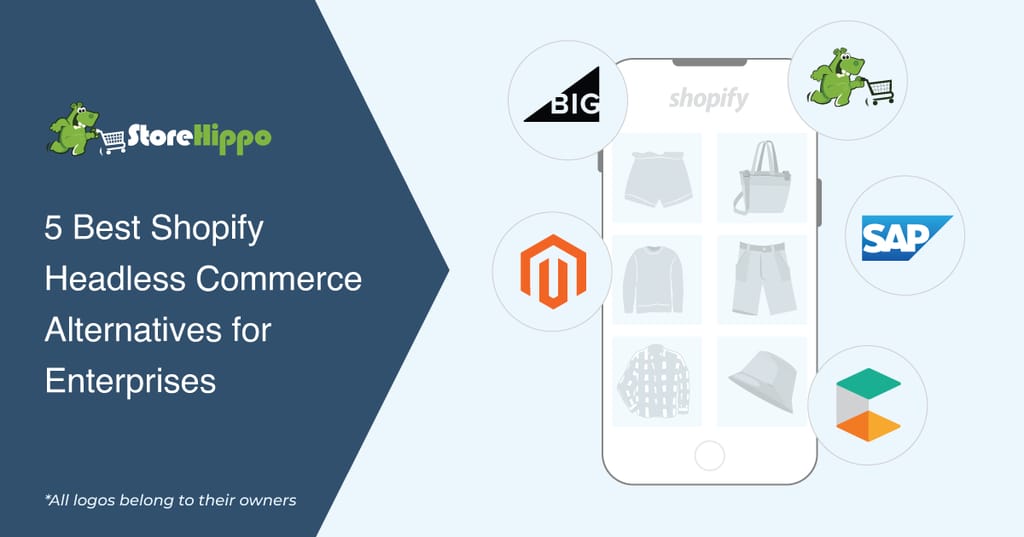Headless commerce has truly revolutionized the eCommerce landscape, and enterprises are now eagerly seeking Shopify headless commerce alternatives to unlock greater freedom and innovation. By decoupling the front-end user experience from the back-end infrastructure, headless commerce empowers brands to deliver flexible, lightning-fast, and seamless shopping experiences across countless touchpoints—web, mobile apps, social commerce, and beyond.
This powerful shift allows businesses to innovate on the fly, making dynamic changes without the need to overhaul the entire system, giving them the agility to stay ahead in today's fast-evolving digital marketplace.
For businesses seeking a Shopify alternative with powerful headless commerce capabilities, we explore five leading platforms—StoreHippo, Magento, BigCommerce, SAP Commerce Cloud, and CommerceTools.
Before we dive deeper and evaluate each one of these, let us first check out some real-life applications of headless capabilities and how they can enhance a brand’s offerings, streamline operations, and boost customer engagement.
Table of Contents
Headless Commerce for Enterprise Brands: Crafting Innovation, Scalability, and Control
Headless commerce is a game-changer for enterprise brands, offering unmatched flexibility to innovate and scale across multiple channels. By separating the front-end and back-end, it gives businesses full control over their customer experiences while ensuring the agility to adapt and grow in an ever-evolving digital landscape.
.png)
Here is how brands using diverse business models can benefit from leveraging decoupled headless solutions:
Headless Commerce for D2C (Direct-to-Consumer) Enterprises
Headless commerce empowers D2C brands to create highly personalized shopping experiences, allowing them to quickly adapt to consumer preferences and trends across multiple touchpoints. By decoupling the front-end, D2C brands can easily update their web store, mobile app, or social commerce platform without impacting back-end operations. This flexibility ensures faster implementation of new features, A/B testing, and seamless customer journeys across channels.
How Nike Mastered Headless Commerce to Deliver a Personalized Buyer Journey Across Every Channel
Nike uses headless commerce solutions to elevate personalized, seamless customer experiences across all channels.
Here are the benefits Nike is able to achieve with decoupled headless solutions:
- Personalized experiences across web, app, retail
- Seamless engagement across all customer touchpoints
- Rapid innovation without backend disruption
- Real-time adaptation to customer preferences
- Cohesive interactions across every shopping channel
- Efficient delivery of promotions and localized content
Headless Commerce for B2C (Business-to-Consumer) Brands
For B2C enterprises, headless commerce enables seamless scaling across various customer touchpoints—whether it’s a global website, mobile app, or social platforms—while ensuring a consistent brand experience. It allows brands to optimize performance, respond to market demands faster, and integrate easily with third-party tools and services to enhance the customer journey. The decoupled architecture supports the rapid deployment of localized or global features.
How Myntra is Disrupting The Fashion and Lifestyle Segment With Headless Commerce Solutions
Myntra uses headless commerce to deliver personalized and seamless shopping experiences for fashion enthusiasts across India.
Here are the benefits Myntra is able to achieve with decoupled headless solutions:
- Tailored fashion experiences across app, web, and social media
- Seamless engagement across mobile, desktop, and in-app platforms
- Rapid rollout of new trends, features, and seasonal promotions
- Real-time adaptation to user preferences and buying behavior
- Consistent and cohesive shopping experience across all channels
- Efficient delivery of personalized offers and localized content across India
Headless Commerce for B2B (Business-to-Business) Marketplaces
In the B2B space, headless commerce helps enterprises manage complex catalogs, custom pricing, and intricate workflows tailored to specific clients. With headless commerce solutions, businesses can provide a self-service experience for corporate clients, streamline the ordering process, and integrate with ERP systems for inventory management and supply chain visibility. B2B enterprises benefit from increased efficiency while maintaining a personalized experience for each client.
How IndiaMART Revolutionised B2B Buying And Selling With A Headless Commerce Powered B2B Marketplace
IndiaMART uses headless commerce on its B2B marketplace to provide personalized and streamlined buying experiences for businesses across India’s vast B2B marketplace.
Here are the benefits IndiaMART is able to achieve with decoupled headless solutions:
- Tailored product catalogs and services across app, web, and mobile
- Seamless interactions for buyers and suppliers across multiple touchpoints
- Quick deployment of new features and business tools without disrupting operations
- Real-time customization of product recommendations and pricing for different buyers
- Consistent experience across devices, ensuring easy access for businesses
- Efficient management of region-specific content and localized supplier offerings
Headless Commerce for B2B2C (Business-to-Business-to-Consumer) Marketplaces
Headless commerce provides B2B2C enterprises with the flexibility to manage a complex network of partners, resellers, and end consumers from a unified platform. It allows businesses to control the B2B and B2C aspects independently, providing a seamless and engaging end-consumer experience while maintaining strong relationships with business partners. This model benefits from the scalability and flexibility to adapt to the needs of both the B2B and B2C segments.
How Nestle Aced the B2B2C Ecommerce Model With Enterprise Headless Commerce Solutions
Nestlé uses headless commerce to seamlessly manage its B2B2C model, delivering tailored experiences to both retail partners and direct consumers through personalized websites and apps.
Here are the benefits Nestlé is able to achieve with decoupled headless solutions:
- Customized experiences for retail partners and consumers across web, mobile, and apps
- Seamless operations between B2B and direct-to-consumer channels without disruption
- Rapid deployment of new products and features across partner and consumer platforms
- Real-time adaptation of content, offers, and promotions for both retailers and end consumers
- Consistent brand experience across all digital touchpoints for partners and customers
- Efficient delivery of region-specific products, promotions, and content across diverse markets
The decoupled approach has empowered enterprises across various industries and business models to achieve significant growth and enhanced customer engagement. To replicate this success, businesses must select the right headless commerce platform for enterprises and thoroughly evaluate what Shopify competitors have to offer, ensuring they find a solution that meets their unique needs and growth aspirations.
Top 5 Shopify Headless Commerce Alternatives for Enterprise Brands
With the amazing benefits headless capabilities render for an enterprise brand, it is essential you choose a Shopify competitor headless commerce platform equipped to handle your current as well as future requirements.
Here’s a detailed comparison of the 5 best Shopify headless commerce alternatives to help you make an informed decision:
1. StoreHippo
.png)
StoreHippo is a robust Shopify headless commerce alternative designed to cater to businesses of all sizes, particularly enterprises in India. Built with a mobile-first, API-driven architecture with microservices, and cloud infrastructure, StoreHippo allows businesses to deliver custom front-end experiences across multiple touchpoints, including websites, mobile apps, and PWAs. Its plug-and-play nature makes it highly adaptable without the need for deep technical expertise.
Headless Commerce Potential:
StoreHippo’s fully decoupled architecture allows businesses to easily implement personalized customer experiences across channels. With native support for PWAs, multi-vendor marketplaces, and mobile apps, businesses can leverage StoreHippo’s 300+ APIs endpoints to create highly responsive and flexible digital storefronts.
Pros:
- API-driven headless architecture: Makes it easy to create custom front-end experiences across multiple channels (web, mobile, PWA) making it the best Shopify alternative with mobile commerce support essential for Indian enterprises.
- Mobile-first approach: Offers mobile apps builder to create Android and iOS mobile apps and PWAs, ensuring a seamless mobile shopping experience.
- Pre-built integrations and plug-and-play solutions: No need for extensive customization to start; includes 300+ built-in features like multi-vendor support, multilingual, multi-store set up, 120+ payment gateways, marketing, logistics and other integrations, and delivery boy apps.
- Omnichannel channel commerce: Easily extend your reach across multiple digital touchpoints using the same backend logic and APIs to create and connect with new frontends.
- Scalability: Inherent scalability due to cloud infrastructure makes StoreHippo the best-suited Shopify headless commerce alternative for large enterprises operating across geographies, business models, and product lines.
- Support for Multiple Business Models: StoreHippo offers out-of-the-box compatibility with a wide range of business models, including B2B, B2C, D2C, B2B2C, Quick Commerce, Hyperlocal, and other innovative and disruptive formats.
- Integrated Marketing Solutions: The platform is SEO-friendly and equipped with a comprehensive suite of marketing tools, such as a blog engine, discount engine, abandoned cart recovery features, and more, designed to streamline omnichannel commerce efforts.
Cons:
- Advanced features are available with higher plans
- Extensive customisations can be done at additional cost on a pro rata basis
- Does not have its own POS, offers integrations with best-in-class POS solutions.
2. Magento (Adobe Commerce)
.png)
Magento, now known as Adobe Commerce, is a flexible open-source platform with advanced headless commerce capabilities and hence considered a good Shopify alternative for enterprises. As a headless solution, Magento’s back-end can be paired with any front-end technology, allowing businesses to craft custom experiences that suit their specific brand and customer journey.
Headless Commerce Potential:
Magento’s API-first approach provides businesses with the flexibility to implement headless architecture and develop unique front-end experiences. It also offers robust integration capabilities, making it one of the most liked headless commerce Shopify alternative for large enterprises that need complex eCommerce functionality.
Pros:
- Highly customizable: Magento’s headless architecture allows businesses to build unique front-ends with full control over both the back-end and front-end.
- Large developer community: Thousands of third-party extensions and plugins are available to enhance functionality.
- Scalable for large enterprises: Handles complex product catalogs, high traffic, and custom workflows.
- Omnichannel experiences: Easily integrate with various sales channels, including mobile apps, IoT, and social platforms.
- Integration with Adobe Experience Cloud: Enhances personalization and customer experience through advanced data analytics.
Cons:
- Requires high technical expertise: A dedicated development team is often necessary to fully leverage Magento’s headless capabilities.
- Expensive enterprise solutions: Adobe Commerce’s high licensing and development costs make it suitable primarily for large enterprises.
- Complex setup: Headless setups with Magento require more effort compared to simpler platforms like StoreHippo or BigCommerce.
3. BigCommerce
.png)
BigCommerce is a cloud-based SaaS platform offering headless commerce functionality through its API-first architecture and used by enterprises searching for Shopify headless commerce alternatives. It is designed for businesses looking to integrate custom front-end solutions without the need for significant technical resources. BigCommerce has built strong partnerships with front-end frameworks and tools, making it easy to create a headless solution with minimal technical complexity.
Headless Commerce Potential:
BigCommerce’s headless architecture is powered by comprehensive RESTful APIs, allowing businesses to use popular frameworks to create custom front-ends. It supports multi-channel commerce, allowing businesses to sell through various touchpoints, including mobile apps, social media, and in-store POS.
Pros:
- Ease of use: BigCommerce’s headless solution is easier to implement compared to complex platforms like Magento, making it ideal for businesses without a large technical team.
- Robust integrations: Easily integrates with third-party solutions for marketing, analytics, CRM, and ERP systems.
- Scalability for enterprise businesses: Handles high-volume sales with minimal effort.
- Multiple front-end frameworks supported: Works well with popular JavaScript frameworks for custom experiences making it a good Shopify alternative for building tailored enterprise stores.
- Omnichannel selling: Seamlessly connects with marketplaces, social commerce, and other digital touchpoints.
Cons:
- Limited customization compared to open-source platforms: BigCommerce is not as flexible as Magento or CommerceTools in terms of deep customization.
- Higher costs at scale: For larger enterprises, BigCommerce’s costs can rise as additional features and higher traffic demands come into play.
- Limited multi-vendor support: Requires third-party apps for more advanced marketplace setups making it a complex headless commerce solution for big brands.
4. SAP Commerce Cloud
.png)
SAP Commerce Cloud is a powerful platform designed for enterprise-level businesses that need complex solutions. It’s part of the broader SAP ecosystem, making it a great Shopify headless commerce alternative for companies that already use SAP products for their ERP and CRM systems. The platform is built with an API-first, headless architecture that enables businesses to create omnichannel experiences across the web, mobile, and IoT.
Headless Commerce Potential:
SAP Commerce Cloud offers API-driven, microservices-based architecture that provides businesses with maximum flexibility to create tailored customer experiences. It is best suited for businesses with complex eCommerce requirements, such as B2B commerce, personalization, and large-scale product catalogs.
Pros:
- Enterprise-grade scalability: Handles vast product catalogs, high traffic, and complex business models with ease.
- Seamless integration with SAP systems: Provides end-to-end business management by integrating seamlessly with SAP’s ERP, CRM, and other enterprise tools.
- Highly customizable: The decoupled architecture allows businesses to create custom front-end experiences across multiple channels using the headless commerce solutions.
- Personalization at scale: Advanced personalization features, driven by data insights, allow businesses to tailor the shopping experience for each customer.
- Omnichannel support: SAP Commerce Cloud enables consistent customer journeys across all digital touchpoints, including mobile, social, and IoT.
Cons:
- High cost: SAP Commerce Cloud is one of the most expensive platforms on the market, making it an exclusive headless commerce platform for enterprises with large scale operations. It is usually inaccessible for smaller enterprise businesses.
- Complex setup: Requires significant technical expertise and resources for initial setup and ongoing maintenance.
- Overly complex for small businesses: The features and capabilities may be overkill for businesses with simpler needs.
5. CommerceTools
.png)
CommerceTools is an API-first platform built from the ground up for flexibility and scalability and a good Shopify headless commerce alternative. It is a pioneer in the microservices architecture approach, which allows businesses to deploy eCommerce functionality as discrete services that can be independently scaled, updated, or replaced. CommerceTools is ideal for businesses that want complete control over their eCommerce system and need to deliver omnichannel experiences.
Headless Commerce Potential:
CommerceTools offers true headless commerce, where every part of the eCommerce process—from product information to checkout—can be handled via APIs. Businesses can use any front-end technology, providing full control over customer experiences across all digital touchpoints.
Pros:
- API-first, microservices architecture: Provides ultimate flexibility and scalability for large businesses with complex needs.
- Omnichannel commerce: Allows businesses to sell across multiple digital touchpoints, from mobile and web to voice and IoT devices.
- Scalability: CommerceTools is a good Shopify alternative designed for large enterprises that need to scale their operations quickly and efficiently.
- Cloud-native platform: Built for the cloud, ensuring high availability, security, and performance.
- Highly flexible: Businesses can choose which microservices to use, allowing them to tailor the platform to their exact needs.
Cons:
- Requires significant development expertise: CommerceTools is highly customizable, but businesses will need a skilled technical team to fully implement and maintain the headless commerce platform for enterprises.
- Costly for smaller businesses: CommerceTools is best suited for large enterprises, and its costs may be prohibitive for smaller or mid-sized companies.
- Complex implementation: The microservices approach can be complex to set up and maintain, requiring ongoing technical expertise.
Conclusion
When it comes to headless commerce Shopify alternatives, each of these platforms offers powerful features that make them reliable solutions for enterprises. However, StoreHippo stands out as the best Shopify competitor for its mobile-first, API-driven architecture, plug-and-play functionality, and scalability. For businesses looking for a solution that is not only flexible but also cost-effective and easy to manage, StoreHippo offers the perfect blend of headless capabilities without the complexity and high costs associated with platforms like Magento, BigCommerce, SAP Commerce Cloud, or CommerceTools.
Ready to future-proof your business with a faster, more powerful Shopify headless commerce alternative? Explore StoreHippo’s cutting-edge headless solutions, start your 14 day free trial now.





















Leave A Comment